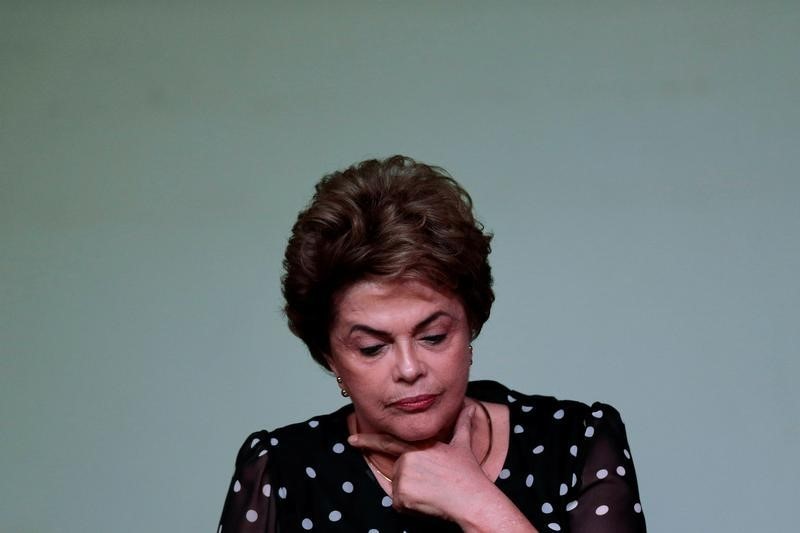By Anthony Boadle
BRASILIA (Reuters) - A wave of scandals buffeting Brazil's interim government is weakening the resolve of some senators to oust suspended President Dilma Rousseff, offering the leftist leader hope of surviving an impeachment trial in the upper house.
Soccer-star-turned-Senator Romario shocked the government last week when he announced he was no longer certain to vote in favour of removing Rousseff. Brazil's first female leader was placed on trial by the Senate last month on charges of breaking budget rules.
His announcement followed a flurry of gaffes, policy missteps and scandals that have rocked the three-week-old administration, including the resignation of two ministers after leaked recordings suggested they tried to block a massive anti-graft investigation at state oil company Petrobras before taking office.
The recordings, taped secretly by a defendant in the Petrobras probe who made a plea bargain deal with prosecutors, appeared to support Rousseff's claim that her impeachment was an opposition conspiracy to seize power and avoid prosecution.
A prosecutor's request on Tuesday for the arrest of four senior members of Temer's PMDB party for allegedly obstructing the investigation - including the Senate speaker and a former Brazilian president - could sway senators who are reconsidering whether to convict Rousseff and permanently dismiss her.
According to surveys by Brazilian media, up to a dozen of the 55 senators who voted last month to put Rousseff on trial are now undecided.
If just a couple of those change sides, the Temer camp would lose the 54 votes it needs - two-thirds of the 81-seat Senate - to convict Rousseff. She would then be able to serve out her term until 2018, though many in Brasilia think she would be too weak to govern and would have to call early elections.
A Rousseff comeback would likely sink Brazilian financial markets, after they rallied strongly at the start of this year on the prospects of her ouster. It could also leave Latin America's largest country in a prolonged state of political deadlock.
"It's going to be very close. I have not decided," Senator Cristovam Buarque told Reuters. "There are six or seven senators who are undecided and could go either way."
Like Romario, who quit his seat on the impeachment commission on June 1, criticizing the appointment of ministers facing investigation in the Petrobras scandal, Buarque says Temer's bad cabinet choices have made some senators think twice.
"The impeachment has become an election between Rousseff and Temer, who will also be judged on his record in government," Buarque said. "The presidency will be decided by two or three votes."
VERDICT DURING OLYMPICS
The Temer camp failed in an attempt on Monday to bring forward the verdict in the trial to late July from mid-August, as it sought to reduce the time for senators to change their minds.
The government had hoped that Temer would be able to open the Olympic Games in Rio de Janeiro on Aug. 5 without lingering doubts about his legitimacy. Instead, the trial could now run until Aug. 16, the middle of the Games.
Temer's supporters hope new allegations of corruption against Rousseff will secure the vote of wavering senators.
Weekly news magazine IstoÉ reported on Friday that Rousseff solicited 12 million reais ($3.41 million) for her 2014 re-election campaign from Marcelo Odebrecht, the former head of Odebrecht, Latin America's largest construction company.
The report cited a plea bargain Odebrecht is negotiating to reduce a 19-year prison sentence for bribery and money laundering. Rousseff strongly denied the report, the first to directly link her to corruption at Petrobras.
Temer's spokesman, Marcio de Freitas, said the government had gained the support of three more senators and predicted 58 would vote to dismiss Rousseff. "We are very calm," he said.
However, some leaders of Temer's Brazilian Democratic Movement Party (PMDB) expressed concern about the close margin.
"I think we will win by 3 to 5 votes. That is very tight," Senator Valdir Raupp, a member of the PMDB executive, told Reuters. He said the economy, mired in its worst recession since the 1930s, must show signs of recovery to guarantee other wavering senators do not back Rousseff.
With 11 million unemployed and inflation running at just over 9 percent, Temer is under pressure from Brazilians to deliver. The economy has contracted more than 7 percent in two years.
Temer's business-friendly economic team led by Finance Minister Henrique Meirelles is tasked with plugging a record deficit. The team was weakened by the resignation of a key figure in passing reforms, former Planning Minister Romero Juca.
Juca departed after the release of one recording in which he suggested a change of government would help defendants in the Petrobras case avoid prosecution.
The cabinet crisis deflated market optimism that Rousseff's removal would put Brazil on a path to fiscal solvency.

"The market is behaving like there is still a risk of Rousseff returning," said Senator Eunicio Oliveira, PMDB leader in the upper chamber. "The quicker this is settled the better for the government."